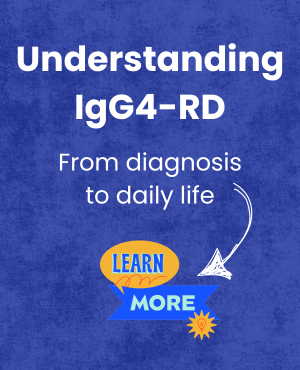People with the inflammatory condition IgG4-related disease (IgG4-RD) face a more severe form of illness when their pancreas is affected, according to a single-center study in China. Specifically, patients who develop autoimmune pancreatitis (AIP) show worse clinical features, especially if the disease also involves the bile ducts, suggesting that…
News
A new program aims to support people with immunoglobulin G4-related disease (IgG4-RD) and their families by helping cover out-of-pocket medical costs associated with treatment. The Assistance Fund (TAF) launched the program to help eligible patients with costs including copayments, health insurance premiums, and incidental medical expenses. “For people…
Imaging scans of people with IgG4-related disease (IgG4-RD) affecting the lungs revealed two primary types of lung damage, which corresponded to different disease features, a study reports. One damage pattern, called round ground-glass opacity (GGO), suggested more extensive injury than the other, and was more frequently associated with male…
A type of imaging scan called DWIBS may offer a safe, noninvasive way to detect immunoglobulin G4-related disease (IgG4-RD) across the entire body with a single scan and track response to treatment more accurately, a small study suggests. “DWIBS can readily detect IgG4-RD lesions throughout the body simultaneously and…
For a 16-year-old girl in Turkey, immunoglobulin G4-related disease (IgG4-RD) manifested as a narrowing of the windpipe, known as tracheal stenosis, which was marked by shortness of breath as the main problem for which she sought treatment. The teen’s symptoms were eased, and her windpipe widened, after treatment with…
As IgG4-related pancreatitis, or pancreas inflammation, becomes increasingly recognized as a manifestation of IgG4-related disease (IgG4-RD), physicians need to better understand how to recognize and treat it, according to a review study giving a comprehensive overview of the clinical features associated with IgG4-related pancreatitis (IRP) and how it should be…
An advisory committee of the European Medicines Agency, or EMA — which evaluations medications for drug approval in the European Union — has recommended Uplizna (inebilizumab) for the treatment of adults with active IgG4-related disease (IgG4-RD). The positive opinion from the EMA’s Committee for Medicinal Products for Human…
People with immunoglobulin G4-related disease (IgG4-RD) are more likely to relapse if they have allergies, multiple organ involvement, or low levels of complement proteins — but using corticosteroid treatments together with immunosuppressants may reduce this risk. That’s according to a meta-analysis of 24 studies that sought to identify potential…
Rituximab is effective for all four clinical profiles of immunoglobulin G4-related disease (IgG4-RD), but two IgG4-RD profiles, or phenotypes, may show poorer responses, according to a multicenter study in Europe. “Patients in the retroperitoneal and aortic and head and neck-limited phenotypes may be less responsive,” the researchers said, and…
Zenas Biopharma has secured up to $300 million from Royalty Pharma to accelerate the development of obexelimab, its investigational treatment that could provide much-needed relief for people with immunoglobulin G4-related disease (IgG4-RD). In exchange, Royalty Pharma will receive a share of royalties on sales of obexelimab, which is…
Recent Posts
- Neurological symptoms may be more common in IgG4-related disease
- Guest Voice: Living with IgG4-RD is the new hobby I didn’t want
- In the language of illness, words can heal, or they can hurt
- IgG4-RD patients with allergy history are more likely to relapse: Study
- Eye muscle involvement may raise relapse risk in IgG4-related eye disease
